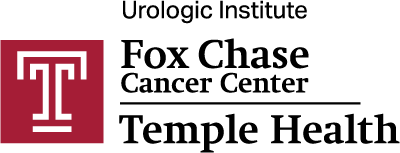

(Download Info Sheet)
With a team that features national leaders in the field, Fox Chase-Temple Urologic Institute's’s Robotic Urologic Surgery program is the gold standard in reconstructive surgery for patients who have experienced traumatic injury to the urinary tract, scarring from cancer treatment or complications from past surgeries.
Boasting the busiest minimally invasive reconstructive practice in the U.S., We have become the go-to solution for many patients who have been told they have no treatment options. Many of those patients travel across the country to seek treatment here. Our surgical team has performed more than 1,000 surgeries on some of the most high-risk patients and complicated conditions.
Pioneering Methods Offer Previously Impossible Outcomes
Our program is so innovative that our surgeons teach its methods in hands-on training courses nationwide and internationally. Our surgeons use robotics to navigate complicated structures such as blood vessels and nerves and perform sophisticated maneuvers in tight spaces. This lets us provide surgical options to patients who have been told they must live with a tube and other hardware inside them for the rest of their lives. Examples include:
- Pioneered the use of near-infrared (NIR) fluorescence in urinary reconstructive surgery to enhance our capabilities and perform surgeries once thought impossible. NIR enables better understanding of the perfusion of tissues in real time and helps identify the urinary tract in a field of dense scarring. The Institute performs one of the largest volumes of uretal reconstructive surgery in the world on a weekly basis.
- Reimagined the traditional buccal graft — from the inner lining of the cheek — by raising that as a free graft, harvesting it from the cheek and laying that on the ureter to supplement the ureter diameter in areas where patients have blockages. In fact, We have the largest buccal ureteroplasty series in the world to treat ureteral strictures and pyeloplasy failures.
- Developed novel modifications for what we call simple prostatectomy so that men with exceptionally enlarged prostate glands can avoid a large open incision. In fact, Our surgeons have operated on prostates weighing in excess of 400 grams. Due to our novel ability to realign the urinary tract, we can reduce postoperative hematuria and enable sameor next-day discharge.
- Redefined use of the appendix for ureteral reconstructive surgery, including use as an apendicele interposition flap, apendicele onlay flap and a newly defined method of performing a ureteral bypass.
- Expertly addressing radiation-based urinary catastrophes or injury problems, including bladder neck contracture or ureteral stricture due to prior surgery or radiation. We regularly perform reconstructive surgeries to address radiation-based urinary needs.

Treating a Wide Array of Urologic Conditions
With our surgeon’s expert use of robotic techniques, we are able to treat a broad array of upper- and lower-tract issues. Therapies are customized for each patient.
Reconstructive surgeries (primarily upper tract)
• Ureteral injury after prior surgery or after radiation
• Ureter obstruction
• Ureteral stricture
• Symptomatic ureteral reflux
• Pyeloplasty failure or pain after prior pyeloplasty
• Pain or obstruction in ureteral duplication anomaly, malrotated kidney, or horseshoe kidney
• Vesico-vaginal fistula
• Ureteral vaginal fistula
• Ureteral blockage after cystectomy and urinary diversion (ureteral enteric stricture)
• Retroperitoneal fibrosis (ureterolysis)
Other types of surgeries for the lower tract
• Robotic simple proctectomy
• Bladder diverticulectomy
• Bladder neck contracture after surgery or radiation
• Supratrigonal cystectomy in urinary diversion
• Persistent bladder fistula
• Bowl based bladder augmentation
• Partial cystectomy for mitomycin induced scaring
• Revisions of the urinary system after prior radical prostatectomy

The region’s most advanced and integrated robotic suites.
Tailored Appraoch for your Patients
Most of these injuries are not common and do not have a defined path toward a resolute treatment. Because this is most of what we treats, our team takes a methodical approach to evaluating our patients. We will request prior imaging and records. For some patients we may repeat studies prior to surgery so that we can get a deeper understanding of the injury. Some patients may need additional testing before a plan can be developed.
We employ novel approaches to optimize the patient before surgery to improve surgical results. For example, stents or tubes are often removed to support ureteral rest for three to four weeks to improve success at the time of surgery.
WHEN TO REFER
- If there is a solution for your patients locally, consider referral to Fox Chase-Temple Urologic Institute to take advantage of our array of novel, innovative approaches.
- Time is of the essence; a faster referral reduces patient anxiety and increases satisfaction.
- Patients who are injured after surgery or diagnosed with iatrogenic (procedure-related) injury should be transferred immediately. We often do not delay these repairs to support improved outcomes.
Key Account Manager Service
Our Key Account Managers are always available to provide information about clinical or research programs, help you quickly resolve any issues, and coordinate contact with physicians and staff.
Andre Daniel
m: 267-605-1945
e: Andre.Daniel@tuhs.temple.edu
Physician Office Locations
Temple Health Center City
Medical Tower,
255 South 17th Street, 7th Floor
Philadelphia, PA 19103
800-TEMPLE-MED
Temple University Hospital – Main Campus
3401 N. Broad Street,
Philadelphia, PA 19140
800-TEMPLE-MED
Fox Chase Cancer Center – Main Campus
333 Cottman Avenue,
Philadelphia, PA 19111
888-369-2427
Fox Chase Cancer Center – Huntingdon Pike
8 Huntingdon Pike,
Rockledge, PA 19046
888-369-2427
Temple Health Ft. Washington
515 Pennsylvania Avenue,
Fort Washington, PA 19034
800-TEMPLE-MED
Fox Chase Cancer Center – Voorhees
502 Centennial Blvd, Suite 7,
Voorhees, NJ 08043
888-369-2427

